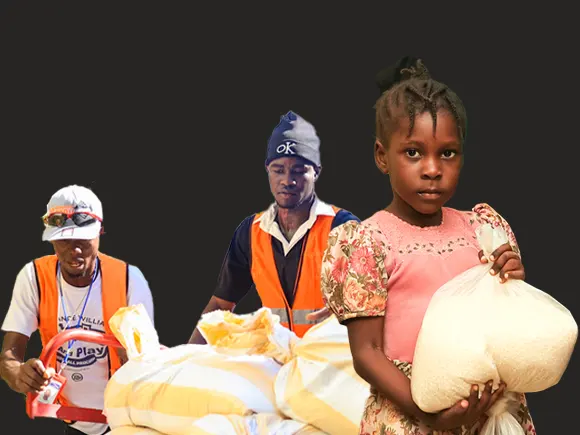Bahamas After Hurricane Dorian: Food For The Poor Takes Next Steps in Recovery
COCONUT CREEK, Fla. (Oct. 1, 2019) Food For The Poor is talking to key leaders in the Bahamas to piece together next steps for longer term aid as families continue to recover from what has been described as one of the largest scale disasters the islands have ever experienced.
A team from the charity recently traveled to the Bahamas to lay the groundwork to help the Bahamians rebuild beyond the initial relief effort and to see firsthand how aid is being distributed.
“You all saved our lives,” said Carrington, whose last name was unavailable. He was grateful to receive food, water and everyday necessities at a church in Freeport.
Hurricane Dorian changed life forever for many people like Carrington, who lost everything, including his job.
“I don’t have any place to stay. I’m sleeping in an old bus until I get my roof on again,” he said.
At least 56 people are dead and nearly 600 are still missing in the aftermath of Dorian. The storm affected some 75,000 residents, according to news reports.
Francine Jean lived in a community known as “The Mudd,” which was built over time by Haitian immigrants. She survived the hurricane by taking shelter in her boss’ home. Her own home was destroyed.
“I don’t have anything to go back to,” she said. “We had to take down all the doors in the house and nail them into the windows so the roof wouldn’t fly off. The water was coming in and very vigorously. It was scary.”
Francine’s plight underscores one of the biggest challenges in the aftermath of Dorian: Determining how best to help the Haitian people who lived in the shantytowns in the Abaco Islands that were devastated when Dorian struck one month ago.
Dr. Jean Paul Charles is President of the Haitian Pastors League, comprised of about 100 clergy across the Bahamas. He chairs a new advocacy group, the United Haitian Community Front that is assisting with the massive task of helping victims of Dorian.
“Whoever was sheltering them, they didn’t have much for themselves,” Charles said. “Residents are on edge. They are agitated. They don’t know what’s next. What will be the future for them? We don’t know that yet.”
Food For The Poor has responded to the urgent need for aid in the Bahamas and shipped 17 tractor-trailer loads of relief goods. The first disaster pallets were sent by air freight within days of Dorian’s passing and were received by HeadKnowles Foundation, working in conjunction with Sandals Foundation, for distribution.
Items sent have included generators, two-burner stoves, blankets and tarps, rice casserole meals, bags of rice and a general assortment of food, juices, water, chainsaws, diapers, hygiene kits and 5-gallon buckets.
Food For The Poor is exploring whether it’s possible to assist with the rebuilding of homes and communities as well as trying to figure out the dilemma of providing fresh water. The charity is working with longtime partner Water Mission to install desalinization units that will provide thousands of gallons of clean water a day.
“We know that the goods we’ve sent have meant the world to those suffering, but the longer term needs are great. Mass numbers of people have been displaced,” said Food For The Poor Executive Vice President Ed Raine. “It’s going to take some time for the Bahamas to recover, but Food For The Poor is committed to being there every step of the way with the support of our dedicated donors.”
On the hour drive from Freeport to the east end of Grand Bahama Island, devastation stretches as far as the eye can see. In some areas, all that remains of homes are foundations with toilets and bathtubs.
The mental shock and anguish of what people survived is still evident, said Cesar Guevara, International Operations Manager in Food For The Poor’s Gifts In Kind Department, who took that drive.
“We stopped at several houses that were partially damaged to see if people needed our help. In one case, I noticed a woman who was digging through the rubble for something in the foundation,” Guevara said. “She was looking for her silverware that she had never used. When we asked what she plans to do, with half of the house gone, she said plans to rebuild and stay.”
The charity is working with trusted partners Archdiocese of Nassau, the Episcopal Church, HeadKnowles Foundation and Sandals Foundation to identify the greatest needs and coordinate distribution of aid. HeadKnowles has distributed aid at nine locations in Freeport and on Grand Bahama and at nine shelters in Nassau. Two 40-foot containers loaded with water and food were distributed by the Episcopal Church.
“Food For The Poor came to our aid almost immediately,” said Fr. David Cooper of the Archdiocese of Nassau. “Many people had to leave their homes in the middle of the night with only the clothes on their backs. The assistance we have received is giving families steady ground they can depend on. It eases their tension for a moment.”
For much of September, South Florida residents, businesses, churches and community organizations dropped off a steady stream of canned meats, canned fish and canned milk, diapers and hygiene items at the charity’s Coconut Creek warehouse.
Here is a video of Food For The Poor Executive Vice President Ed Raine describing how the charity is responding in the Bahamas: https://youtu.be/jgIkjjGr3mY
Please go to www.FoodForThePoor.org/bahamas to make a donation.
Food For The Poor, one of the largest international relief and development organizations in the nation, does much more than feed millions of the hungry poor primarily in 17 countries of the Caribbean and Latin America. This interdenominational Christian ministry provides emergency relief assistance, clean water, medicine, educational materials, homes, support for orphaned or abandoned children, care for the aged, skills training and micro-enterprise development assistance. For more information, please visit www.FoodForThePoor.org.
Michael Turnbell
Public Relations
954-427-2222 x 6054
michaelt@foodforthepoor.com
